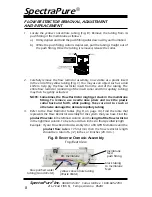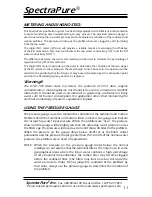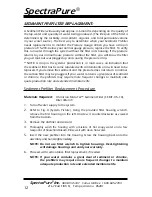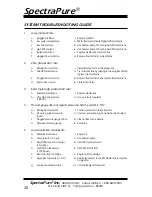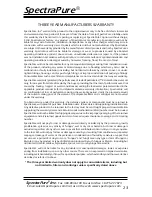
SpectraPure
®
Inc
.
Fax 480.894.6109 Fax us toll-free 1.877.527.7873
E-mail: [email protected] Visit us on the web www.spectrapure.com
9
SpectraPure
®
4. Using a
new
single-edge razor blade, carefully measure and then cut the flow
restrictor to the total length calculated.
(Do not cut with scissors.)
5. Reinsert the flow restrictor assembly into the yellow tubing and firmly reseat
the insert into the end of the yellow tubing by carefully pressing on the insert
with your thumbnail. Care should be taken not to crush or otherwise damage
the end of the capillary tubing protruding from the end of the insert.
6. Reinsert the yellow tubing into its push fitting in the RO membrane as follows:
a.) Moisten the O-ring seal inside the concentrate outlet fitting by dripping a
few drops of clean water into the fitting.
b.) Grasp the yellow tubing near the flow restrictor end, and insert the
tubing into the push fitting. Push the tubing into the fitting until resis-
tance is felt, approximately 1/2 inch (12.7 mm). The tubing is now resting
on the O-ring seal inside the fitting.
c.) Firmly push the tubing approximately an additional 1/4 inch (6.35 mm)
further into the fitting to completely seat the line into the fitting and
O-ring seal.
7. Turn on the system water supply and check for leaks prior to further use or
testing. If a leak is observed, you may not have pushed the yellow tubing into
the push fitting far enough to seal the tubing against the O-ring. Turn off the
system water supply and re-seat the tubing as described above. If the retested
ratio is between 3:1 and 4:1, this procedure is complete.
YELLOW TUBING:
(Disconnected
from membrane
housing’s fitting.)
CAPILLARY TUBE:
(Specific diameters
are matched for
each size membrane
to restrict the flow of
waste water leaving
the RO membrane’s
housing.)
PLASTIC INSERT: (Insert keeps
capillary tube in the yellow line and
prevents it from washing down the
drain. It also forces waste water to
flow through the capillary tubing to
restrict waste water as it leaves the
housing.)
Fig. C: Flow Restrictor Assembly








